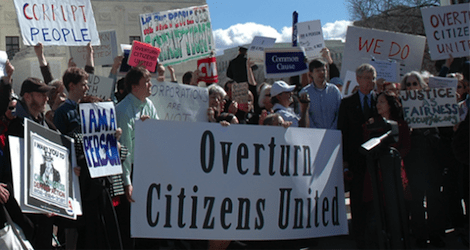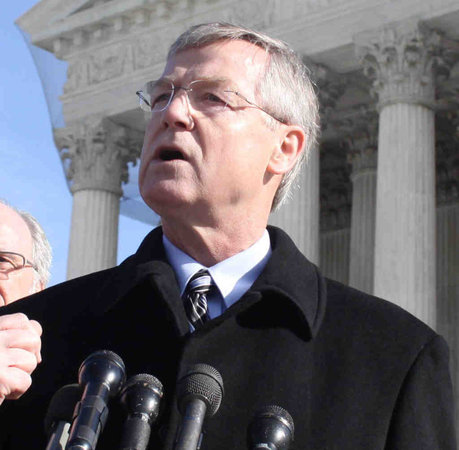Responding to Citizens United and the Rise of Super PACs
What are the critical threats to the ethical and effective functioning of democracy? In response to that question, the Rev. Dr. Chris Iosso wrote “Seven Sins Against Democracy: And What’s Faith Got To Do With It” and then invited knowledgeable respondents to join the conversation, expanding upon some of the sins he identified. The following is a response to the second “sin” of Super PACs and unlimited campaign finance—and is an adaptation of Common Cause’s testimony to the Subcommittee on The Constitution, Civil Rights and Human Rights of the United States Senate Committee on the Judiciary Hearing. By Rev. Bob Edgar, President of Common Cause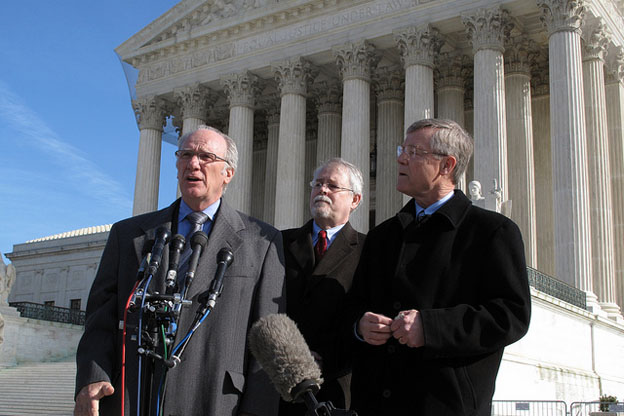
Bob Edgar, Gerry Hebert, and Nick Nyhart with Common Cause hold a press conference on the Citizens United Supreme Court decision.
Super PACs have transformed our elections into the sport of kings. Billionaires and corporations are pooling unlimited sums of money into joint accounts, pledging astronomical sums in support of or in opposition to candidates, and recklessly drowning out the voices of the American people. These corporations and mega donors are motivated by an expectation of influence and access, often at the expense of the public interest. We cannot afford to auction off our vibrant democracy to the highest bidder. Therefore, Common Cause is calling for an Amendment to the Constitution to restore the voices of average, ordinary Americans in our elections once and for all.
The Problem of Super PACs
Independent expenditure-only political committees, so-called Super PACs, are the byproduct of two federal court decisions. In the first case, Citizens United v. FEC, the United States Supreme Court ruled by fiat that corporations enjoy a constitutional right to spend an unlimited amount of their general treasury funds influencing our elections.[i] Overturning a century of law with the stroke of a pen, the five-Justice majority reasoned—without citing a shred of evidence—that “independent expenditures, including those made by corporations, do not give rise to corruption or the appearance of corruption.”[ii] Months later, a federal appeals court explicitly relied on Citizens United to hold that “contributions to groups that make only independent expenditures also cannot corrupt or create the appearance of corruption.”[iii]
These decisions turn common sense on its head. To rule that a corporation’s spending on elections is not intended for an exchange of favorable policy, access, and influence belies reality.
The breathtaking indifference of the Supreme Court to well-settled precedent (and facts) shook democracy to its core, and unleashed a torrent of secret money over our subsequent federal elections. Super PACs quickly opened for business, soliciting tens of millions of dollars, including money funneled through sham corporate front groups that exist for no other reason than to hide the identity of political spenders from the electorate.
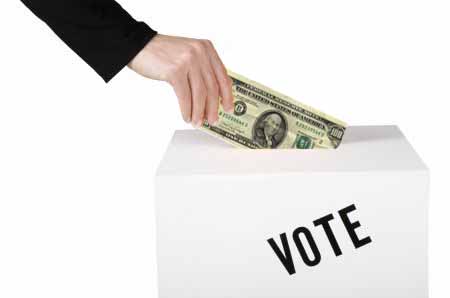 The Money
The Money
2010 marked the first election year of Super PAC dominance in our elections. That year, 84 Super PACs collected over $84.9 million, spending $65.3 million of that amount on political expenditures.[iv] Outside spenders, excluding party committees, dumped over $299 million in independent expenditures, electioneering communications and other communication costs.[v] Other non-disclosing groups, such as tax-exempt nonprofit organizations, spent over $132 million influencing our elections.[vi] Disturbingly, 44% of outside spending in 2010 came from sources that failed to disclose their donors, compared to 25.2% in 2008, and just 1.3% in 2006.[vii]
2012 will be the most moneyed election in our history. As of this writing, the number of Super PACs has risen exponentially to 678, and they have already spent $144 million of the $281 million that they have raised thus far.[viii] By comparison, at this point in 2008 with over three months to go before Election Day, outside groups had spent a little over $36 million on independent political expenditures, even then a significant sum but paling in comparison to what’s been spent already this year.[ix] Some Republican-aligned groups led by Karl Rove, the Koch brothers, and the United States Chamber of Commerce are planning to spend approximately $1 billion on federal elections this cycle.[x]
While a significant percentage of funds donated to Super PACs are directly paid out of for-profit corporate coffers, an even larger percentage is coming from wealthy individual donors—with 93% of Super PAC’s itemized contributions from individuals in contributions starting at $10,000.[xi] To be clear—the very few are determining which candidates are viable and which candidates will fail.
 Controlling Who Gets to Speak
Controlling Who Gets to Speak
Super PACs and other wealthy donors are muffling the voices of political participants by snapping up airtime at a premium. Participation is becoming more expensive, because airtime is a scarce commodity, particularly in swing states. The National Journal explained in a recent article that demand is already forcing airtime prices to “skyrocket.”[xii]
Citizens United and its progeny actually have the deleterious effect of squelching speech. The voices of the wealthy and the corporations are able to speak the loudest, granting a very small minority the right to determine who is heard and who is relegated to silence on the airwaves. Where political commercials are stacked on top of each other—the overwhelming majority of which are negative—the bombardment of political ads will desensitize voters, and lead to many tuning out from politics completely and disregarding the speech of even those who can afford to buy it in modest amounts.[xiii]
Amend the Constitution
While it is “emphatically the duty of the [courts] to say what the law is,”[xiv] it is We the People that adopt the Constitution as the law’s most basic foundation. A line of Supreme Court cases, from Buckley v. Valeo through Citizens United, have wrongly interpreted the First Amendment, extending its application to artificial entities of government like corporations and protecting their ability to electioneer, even though their interests are, by law, radically different than those of living, breathing human beings. Further, the courts equate unlimited expenditures and sums of money as constitutionally-protected speech, when in fact it is property. The poisonous effects of these decisions present a grave harm to our democracy, as demonstrated by the rise of Super PACs and secretive nonprofit spending. It is necessary, therefore, that the people make permanent our core political values in a Constitutional amendment to provide that corporations are not entitled to the constitutional rights of real people, and that unlimited spending on politics is not free speech.
It is time for the people to reclaim our democracy.
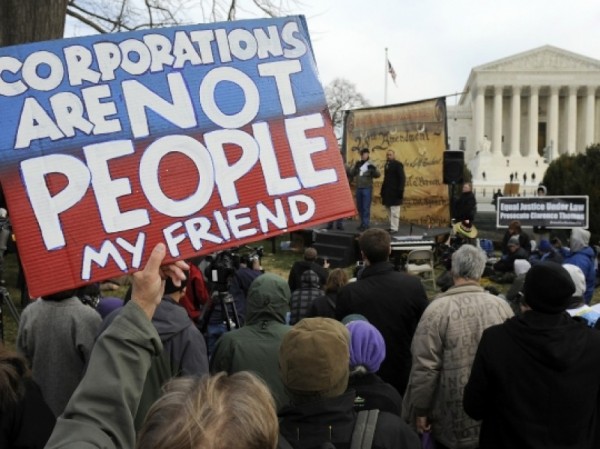 Corporations are Not Entitled to the
Corporations are Not Entitled to the
Constitutional Rights of Real People
Corporations are privileged with limited liability and perpetual life for economic purposes. Their interests are not always—nor often—the same as those of citizens. Corporate spending in our elections distorts the political process far more than even large donor money, because corporations are using their general treasury funds to influence policy, when its treasury’s purpose was instead to drive the engine of economic growth. The law obligates corporations to put profits ahead of the greater societal good, whereas real living, breathing people must balance their narrow interests with a broader public interest when making political decisions at the ballot box.
The Constitution is intended to protect the rights of individual human beings. Corporations are mentioned nowhere in the Constitution—and their authority cannot exceed that of “We the People.” While corporations make important contributions to society as engines of economic growth, the government grants them certain privileges that allow them to collect vast sums of money, but has never considered them “real people” with rights to dictate electoral outcomes. In Austin v. Michigan Chamber of Commerce, the Court recognized that “the corrosive and distorting effects of immense aggregations of wealth that are accumulated with the help of the corporate form and that have little or no correlation to the public’s support for the corporation’s political ideas” posed a serious threat to our republican form of self-government.[xv]
Unfortunately, Citizens United explicitly reversed Austin in its entirety.[xvi] Lamenting the majority’s reckless decision, Justice Stevens dissented by writing that “corporations have no consciences, no beliefs, no thoughts, no desires. Corporations help structure and facilitate the activities of human beings, to be sure, and their ‘personhood’ often serves as a useful legal fiction. But they are not themselves members of “We the People” by whom and for whom our Constitution was established.”[xvii]
Most egregiously, corporations have abused their “rights” bestowed on them by the courts to overturn democratically enacted laws that municipal, state, and federal governments passed to curb corporate abuse, impairing local governments’ ability to protect their citizens against corporate harms.
Unlimited Spending on Politics is Not Free Speech
It was in Buckley v. Valeo that the Supreme Court upheld limits on contributions to candidates because such restrictions were justified by corruption or the appearance thereof;[xviii] but it wrongly rejected the compelling interest of leveling the playing field to guarantee that all citizens, irrespective of wealth and resources, have an opportunity to make their political views known.[xix]
For too long, the only government interest compelling enough to protect the voices of average, ordinary Americans in our politics has been that of corruption or the appearance thereof. In the wake of Citizens United, even that compelling interest is crumbling. While protection against corruption is exceedingly important—and continues to justify important regulations that protect our democracy from embracing full legalized bribery—another important government interest must be recognized: equality. Americans of every stripe must have an equal opportunity to be heard in the election process, and not be drowned out by mega-wealthy donors who equate the size of their bank accounts with their right to be heard over other citizens.
Justice Stevens put it most eloquently in his concurrence in Nixon v. Shrink Mo. Gov’t PAC. He wrote to make “one simple point: money is property; it is not speech… The right to use one’s own money to hire gladiators, or to fund ‘speech by proxy,’ certainly merits significant constitutional protection. These property rights, however, are not entitled to the same protection as the right to say what one pleases.”[xx]
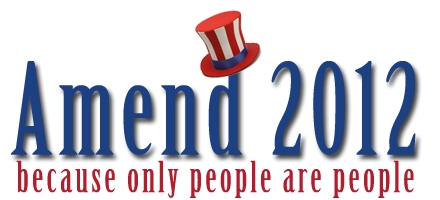 Amend2012
Amend2012
Citizens across the country are rising up to instruct Congress that the time has come to enact a constitutional amendment that encompasses these principles. This fall in Montana, for example, citizens will vote on Initiative 166—the “Prohibition on Corporate Contributions and Expenditures in Montana Elections Act.” This initiative would charge Montana’s delegation in Congress to support an amendment to the United States Constitution to nullify the Supreme Court’s ruling in Citizens United v. FEC. The initiative is supported by leading Montana Democrats and Republicans, including many small businesses. The Committee collected more than 40,000 signatures—far more than is required.
Beyond the ballot box, legislatures in Hawaii, California, New Mexico, Rhode Island, and Vermont and other towns and city councils across the country have passed resolutions calling for a constitutional amendment overturning the constitutional right of corporations to spend money on our political campaigns.
Make no mistake: the unchecked power of Super PACs and unlimited political spending by corporations and the very wealthy, left to its own devices, threatens to swallow the very democracy it seeks to buy.
Learn more and get involved with Common Cause
ACTION: Support Amend2012 by signing the petition, volunteering, and/or spreading the word
Read about other threats to democracy in the complete series, “Seven Sins Against Democracy”
Notes
[i] 130 S. Ct. 876 (2010).
[ii] Id. At 909.
[iii] SpeechNow.org v. FEC, 599 F.3d 686, 694-95 (D.C. Cir. 2010).
[iv] Super PACs, CENTER FOR RESPONSIVE POLITICS (last updated July 8, 2012).
[v] Total Outside Spending by Election Cycle, CENTER FOR RESPONSIVE POLITICS (last visited July 17, 2012).
[vi] Spending by Viewpoint for Non-Disclosing Groups, CENTER FOR RESPONSIVE POLITICS (last visited July 16, 2012).
[vii] Outside Spending by Disclosure, Excluding Party Committees, CENTER FOR RESPONSIVE POLITICS (last visited July 17, 2012).
[viii] Super PACs, CENTER FOR RESPONSIVE POLITICS (last visited July 17, 2012).
[ix] Total Outside Spending by Election Cycle, Excluding Party Committees, CENTER FOR RESPONSIVE POLITICS (last visited July 17, 2012).
[x] Mike Allen & Jim Vandehi, GOP Groups Plan Record $1 Billion Blitz, POLITICO, May 30, 2012.
[xi] BLAIR BOWIE & ADAM LIOZ, AUCTIONING DEMOCRACY 1, De?mos & U.S. PIRG (2012).
[xii] Reid Wilson, Buy Early and Often, NAT’L J., May 23, 2012.
[xiii] Sean J. Miller, Could We Run Out of Airtime?, CAMPAIGNS & ELECTIONS, Mar. 21, 2012. See generally Louisa Ha & Kim McCann, An Integrated Model of Advertising Clutter in Offline and Online Media, INT’L J. OF ADVERTISING (2010).
[xiv] Marbury v. Madison, 5 U.S. (1 Cranch) 137 (1803).
[xv] 494 U.S. 652, 660 (1990).
[xvi] 130 S. Ct. 876, 882 (2010).
[xvii] Id. at 972 (Stevens, J., dissenting).
[xviii] 424 U.S. 1, 29 (1976).
[xix] See id. at 48-49.
[xx] 528 U.S. 377, 398-399 (2000) (Stevens, J., concurring).
The Rev. Bob Edgar is a United Methodist minister, the President of Common Cause, former General Secretary of the National Council of Churches of Christ, former President of Claremont School of Theology, and a Member of the House of Representatives from Pennsylvania. Rev. Edgar presented some of these ideas last January to the Social Ethics Network of Presbyterian ethicists meeting at the New York Avenue Presbyterian Church. Please see the Common Cause website for additional analysis of needed political reforms, including criteria for Supreme Court Justices to recuse themselves from cases due to conflicts of interest.
